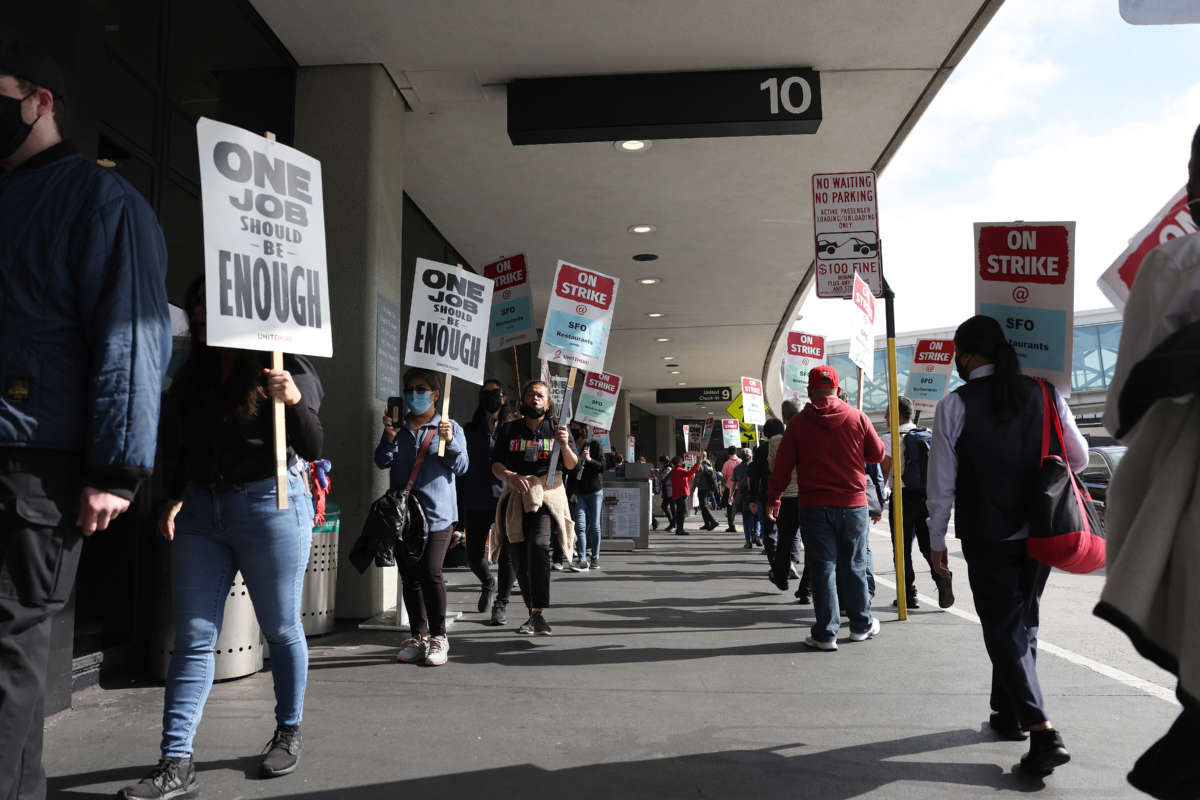San Francisco airport workers ended a three-day strike Thursday after reaching a tentative deal that includes “significant” pay increases and improved healthcare benefits.
The deal, which still must be ratified by union members, came after around 1,000 restaurant, coffee shop, and bar workers at the San Francisco International Airport (SFO) walked off the job to demand better wages and conditions, temporarily shuttering the operations of many of the airport’s food and drink spots.
Represented by UNITE HERE Local 2, the workers noted that they haven’t received a wage increase in three years even as costs of living have surged, forcing many to work more than one job to meet basic needs. The majority of food workers at the airport make $17.05 per hour, the union said — far below the estimated living wage for San Francisco.
“This strike was so worth it to give my family a better life,” said Blanca Gay, a snack bar attendant who has worked at SFO for 30 years. “My son is in college, but he had to switch from full-time to part-time just so he could work.”
“With the raises we won, I can help my son go back to school full-time,” Gay continued. “All the hard work and sacrifice of the strike has paid off for my family.”
The union, which negotiated the deal with the SFO Airport Restaurant Employer Council, called the pay hikes “huge” but said the details of the agreement won’t be released until after the workforce holds a ratification vote on Sunday. In August, 99.7% of SFO food service workers voted to authorize the strike.
“This victory shows the world that fast-food jobs can in fact be good, family-sustaining jobs, and it’s all because workers had the courage to strike,” Anand Singh, president of UNITE HERE Local 2, said in a statement. “After three years without a raise, SFO’s fast-food workers were tired of working two or even three jobs just to survive — so they took their lives into their own hands and won a better future.”
When we fight, we win! https://t.co/YHkHjDYrCa
— UNITE HERE (@unitehere) September 29, 2022
The strike by SFO workers came amid a broader wave of labor actions across the United States as companies continue to rake in record profits on the backs of their underpaid employees, many of whom have seen their wages eroded by corporate-driven inflation.
Citing data from Cornell University’s Labor Action Tracker, journalist Michael Sainato reported for The Guardian earlier this week that “strikes in 2022 so far have significantly outpaced strike activity in 2021, with 180 strikes involving 78,000 workers in the first six months of 2022, compared with 102 strikes involving 26,500 workers in the first six months of 2021.”
Johnnie Kallas, project director for the Labor Action Tracker, told Sainato that “strikes appear to be increasing as we head into the fall.”
“These strikes are being led by workers in the service sector,” said Kallas. “Starbucks workers have organized over 70 strikes so far this year in response to poor working conditions and employer retaliation. Over the past month, thousands of healthcare workers and educators have gone on strike to protest understaffing, low pay, and poor conditions for patients and students.”
Press freedom is under attack
As Trump cracks down on political speech, independent media is increasingly necessary.
Truthout produces reporting you won’t see in the mainstream: journalism from the frontlines of global conflict, interviews with grassroots movement leaders, high-quality legal analysis and more.
Our work is possible thanks to reader support. Help Truthout catalyze change and social justice — make a tax-deductible monthly or one-time donation today.
